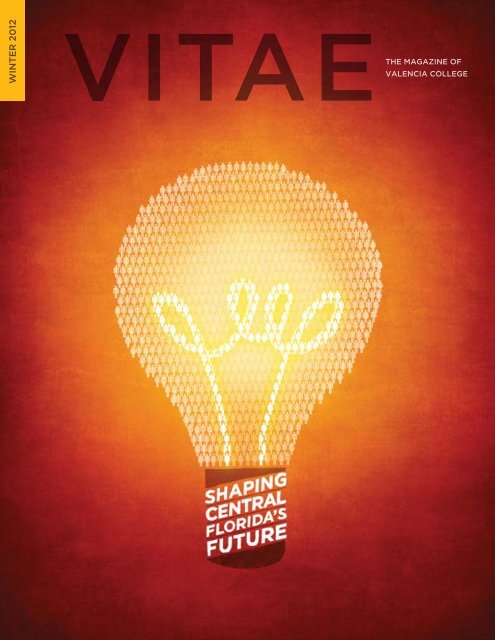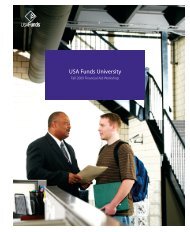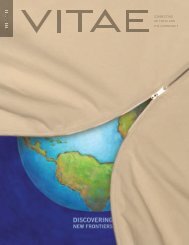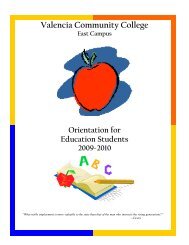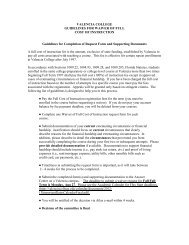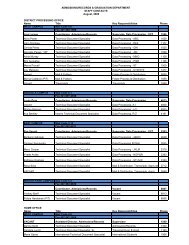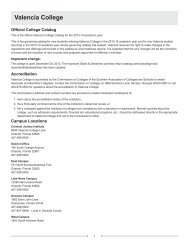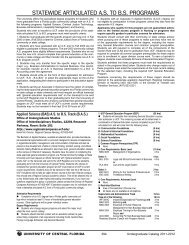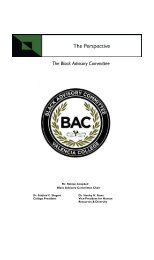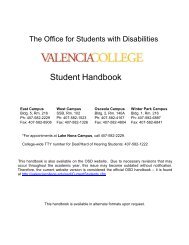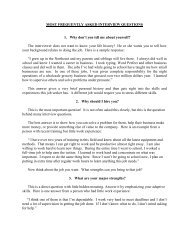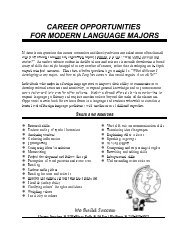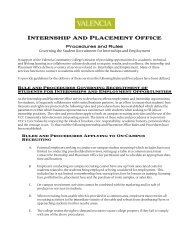Issue 10, 2012 Winter - Valencia College
Issue 10, 2012 Winter - Valencia College
Issue 10, 2012 Winter - Valencia College
You also want an ePaper? Increase the reach of your titles
YUMPU automatically turns print PDFs into web optimized ePapers that Google loves.
winter <strong>2012</strong><br />
VITAEthe magazine of<br />
<strong>Valencia</strong> college
VITAE<br />
Rooted in the Latin word for “life,” vitae (vee-tay) means:<br />
the course of one’s life or career; a short account of a<br />
person’s life; a résumé. Because the purpose of this magazine<br />
is to keep you connected to <strong>Valencia</strong>, the title Vitae reflects<br />
the collective résumé of alumni, faculty, staff and students<br />
who have proudly walked through our doors.<br />
<strong>Valencia</strong> Alumni Association<br />
leadership Team:<br />
President Michael J.G. McLaughlin ’03<br />
Co-Vice President Shardeh Berry ’12<br />
Co-Vice President Esperanza Perez ’12<br />
Secretary Marceline (Marcy) Porter ’05<br />
Team Members Zia-ur-Rehman Ansari ’<strong>10</strong><br />
Yassir Baroudi ’12<br />
Julie Bennett ’01<br />
Ashley S. Bravo ’12<br />
Nicole I. Bright ’03<br />
Maryam Hemmali ’<strong>10</strong><br />
Lauren Kaplan ’06<br />
Mary E. Myers ’05<br />
Rebecca A. Reis-Miller ’01<br />
Laureen Swaby ’99<br />
Contributors:<br />
Linda Shrieves Beaty<br />
Geraldine Gallagher<br />
Roger Moore<br />
Barbara Shell<br />
Carol Traynor<br />
Melissa Tchen<br />
Editor:<br />
Carol Traynor<br />
Design & Illustration:<br />
Mostapha Aguenegou ’04, ’05<br />
Dean Scott ’83, ’08<br />
Tracey Ellegiers<br />
Photography:<br />
Don Burlinson<br />
(unless otherwise credited)<br />
Vitae is published biannually by <strong>Valencia</strong>’s Marketing and Strategic<br />
Communications Division in coordination with Alumni Relations for<br />
approximately 42 cents an issue. Opinions expressed in this magazine<br />
do not necessarily reflect the official position of <strong>Valencia</strong> <strong>College</strong> or the<br />
<strong>Valencia</strong> Alumni Association.<br />
The <strong>Valencia</strong> Alumni Association provides opportunities<br />
for lifelong personal, educational and professional growth<br />
for alumni and students of <strong>Valencia</strong> <strong>College</strong>.<br />
<strong>Valencia</strong> is a member of the Florida <strong>College</strong> System.<br />
16<br />
1800 S. Kirkman Rd., Orlando, FL 32811, 407-582-<strong>10</strong>17<br />
Photograph by Kelly Warren-Underwood
ISSUE No. <strong>10</strong><br />
18<br />
contents<br />
20<br />
2 <strong>Valencia</strong> News<br />
8 <strong>Valencia</strong> Events<br />
14 Experts Spotlight<br />
Mark Hose<br />
15 Legislative Update<br />
Florida First Proposal<br />
16 Lake Nona Campus<br />
In Photos<br />
18 Arts at <strong>Valencia</strong><br />
Duarte Brothers<br />
26 Sweet Success<br />
Kwame Walker<br />
28 Class Notes<br />
33 Foundation Spotlight<br />
Jonni Kimberly<br />
34 Events Snapshots<br />
features<br />
4 $1 Billion and Counting<br />
<strong>Valencia</strong>’s Economic Impact<br />
<strong>10</strong> Embracing the<br />
Entrepreneurial Spirit<br />
Profile on Enterprising Grads<br />
20 The Route to Prosperity<br />
How <strong>College</strong>s Are Shaping our Economy<br />
<strong>10</strong><br />
VITAE, WINTER <strong>2012</strong> 1
<strong>Valencia</strong> NEWS<br />
Osceola Honors<br />
9/11 Victims with<br />
Field of Flags<br />
To honor the victims of the<br />
Sept. 11, 2001, terrorist attacks, the<br />
Osceola Campus teamed up with<br />
the Rotary Club of Lake Nona to<br />
stage a dramatic display of flags on<br />
its expansive lawn—one flag for each<br />
of the nearly 3,000 lives lost on that<br />
tragic day.<br />
Kathleen Plinske, president<br />
of the Osceola and Lake Nona<br />
campuses, came up with the idea as<br />
a way for students, many of whom<br />
were only six or seven years old at<br />
the time, to learn about the events of<br />
that day.<br />
The display also served as the<br />
backdrop for Osceola County’s<br />
Sept. 11 memorial service, which<br />
included participants from the<br />
Osceola County Sheriff’s Office,<br />
Osceola County Emergency Services,<br />
Kissimmee and St. Cloud police and<br />
fire departments, and the Osceola<br />
County Veterans Council.<br />
Photograph by Julie Fletcher<br />
National Magazine<br />
Spotlights <strong>Valencia</strong><br />
for ‘Ideas That<br />
Are Transforming<br />
Education’<br />
“Orlando Magic” was the headline<br />
of a feature story on <strong>Valencia</strong> in<br />
the Oct. 6 edition of the National<br />
Journal magazine. In a series titled<br />
“Restoration Calls,” <strong>Valencia</strong> was<br />
cited as an example of how new<br />
thinking could transform higher<br />
education and the economic fortunes<br />
of students.<br />
The National Journal, published<br />
in Washington, D.C., reports on<br />
the current political environment<br />
and emerging political and policy<br />
trends. Readership includes members<br />
of Congress and other influential<br />
individuals beyond the Beltway.<br />
2 • <strong>Valencia</strong> News
DirectConnect a<br />
Winner at Helping<br />
Latinos Excel<br />
<strong>Valencia</strong>’s DirectConnect to UCF<br />
program was selected by Excelencia<br />
in Education, a Washington, D.C.-<br />
based organization, as among the best<br />
programs in America for increasing<br />
academic opportunities and success<br />
for Latino students. Top honors also<br />
went to programs run by California<br />
State University Bakersfield and<br />
the University of Texas, El Paso.<br />
All honorees had to demonstrate<br />
that they effectively boost Latino<br />
enrollment, performance and<br />
graduation.<br />
The DirectConnect to UCF<br />
program guarantees that graduates<br />
of <strong>Valencia</strong> and three other Central<br />
Florida colleges can start at UCF<br />
as juniors, offering students a<br />
real advantage as UCF becomes<br />
more selective in its admissions.<br />
Today, nearly a quarter of UCF’s<br />
baccalaureate graduates—and the<br />
majority of its Hispanic grads—are<br />
transfer students from <strong>Valencia</strong>.<br />
<strong>Valencia</strong> Makes<br />
Military-Friendly List<br />
With the second largest<br />
enrollment of veterans among<br />
Florida’s state colleges, <strong>Valencia</strong><br />
has made the 2013 Military<br />
Friendly Schools list (www.<br />
militaryfriendlyschools.com).<br />
“Inclusion on the list of Military<br />
Friendly Schools shows <strong>Valencia</strong><br />
<strong>College</strong>’s commitment to providing<br />
a supportive environment for<br />
military students,” said Sean Collins,<br />
director for G.I. Jobs and vice<br />
president at Victory Media, which<br />
publishes the list.<br />
<strong>Valencia</strong> provides veterans services<br />
on all of its campuses, including<br />
assistance with VA benefits, student<br />
support, workshops and activities.<br />
There’s also a student veterans<br />
club, a veterans-only speech class,<br />
and professional development to<br />
help faculty recognize the unique<br />
challenges of veterans in integrating<br />
into the college environment.<br />
The list honors the top 15 percent<br />
of colleges, universities and trade<br />
schools in the country that are doing<br />
the most to embrace America’s<br />
military service members, veterans<br />
and spouses as students and ensure<br />
their success on campus.<br />
VITAE, WINTER <strong>2012</strong> <strong>Valencia</strong> News • 3
4<br />
By Linda Shrieves Beaty
What’s a<br />
college worth<br />
to a community?<br />
It’s more than just the dollars that students spend on meals and apartments.<br />
Instead, a college contributes to the overall economy of its hometown in many<br />
ways—from the higher wages that college graduates earn and then spend in that<br />
region to money the college spends on everything from stationery to electricity,<br />
from food service contracts to instructors’ salaries.<br />
And in <strong>Valencia</strong>’s case, the college is worth a whopping $1 billion a year<br />
to Central Florida.<br />
That’s the conclusion of an independent economic impact study, conducted by<br />
Economic Modeling Specialists Inc. of Idaho. The study, the first one conducted<br />
in <strong>Valencia</strong>’s 44-year history, found that the college generates close to 3,000 jobs<br />
and spends $231 million each year on buildings, salaries, services and supplies. In<br />
addition, the study found that <strong>Valencia</strong>’s graduates contribute $781.7 million in<br />
earnings, spendings and savings to the region’s economy each year.<br />
From higher earnings to job placement, the value of a <strong>Valencia</strong> education plays<br />
out every day in the lives of our graduates. Turn the page to read the stories of<br />
three recent grads.<br />
Want to learn more about <strong>Valencia</strong>’s value to the Orlando area? Check<br />
out “<strong>Valencia</strong> Counts,” an easy-to-understand video that tells how much<br />
<strong>Valencia</strong> is worth to you: news.valenciacollege.edu/impact<br />
VITAE, WINTER <strong>2012</strong><br />
5
$<br />
1.00<br />
INVESTED<br />
IN EDUCATION<br />
EQUALS<br />
$<br />
5.60<br />
INCOME<br />
INCREASE<br />
Eric Palm<br />
When the newspaper business started<br />
changing—moving articles and content to<br />
the Internet—Eric Palm knew he had to<br />
change too. So Palm, a graphic designer<br />
and copy editor, signed up for some classes<br />
at <strong>Valencia</strong> so he could learn about Adobe<br />
Flash Player, a computer program that<br />
newspaper designers were using to create<br />
interactive web pages.<br />
After getting laid off in 2009, Palm<br />
invested most of his unemployment<br />
compensation in <strong>Valencia</strong>—where he took<br />
classes in two different tracks, digital media<br />
and graphic design. And, thanks to class<br />
projects and volunteer work that he and<br />
his classmates did for local nonprofits,<br />
Palm made connections at <strong>Valencia</strong> that<br />
paid off handsomely.<br />
In Feb. 2011, Palm landed a one-year<br />
contract job with Lockheed Martin. While<br />
there, he met a Disney executive looking<br />
for someone who could write, but was also<br />
adept with digital media and video. The job<br />
seemed like a perfect fit for Palm’s skillset.<br />
Today, Palm works on the social media<br />
team for Disney’s recruiting arm—charged<br />
with attracting job candidates for Disney’s<br />
many divisions, from Walt Disney Studios<br />
to ESPN.<br />
And the bonus? Palm is earning more than<br />
he did in the newspaper business.<br />
“I thought I was going to be in newspapers<br />
forever, but the world changed,” says Palm,<br />
now 38. “Luckily, I think I’ve been able to<br />
recover nicely. And I’m making more money<br />
than I ever have.”<br />
JOB PLACEMENT RATE<br />
6
Shardeh Berry<br />
When Shardeh Berry transferred from<br />
<strong>Valencia</strong> <strong>College</strong> to the University of Central<br />
Florida this fall, she was surprised by the<br />
number of UCF students who knew her.<br />
“I’m taking a public administration class<br />
and we have to introduce ourselves and<br />
I’ve found a lot of recent <strong>Valencia</strong> grads in<br />
my class,” said Berry, who was <strong>Valencia</strong>’s<br />
Distinguished Graduate for the Class of <strong>2012</strong>.<br />
And though she doesn’t know their<br />
names, many of them know hers—because<br />
they remember her speech at the May <strong>2012</strong><br />
commencement ceremony. “In my classes,<br />
more than half of the students are transfer<br />
students—and many of them are from<br />
<strong>Valencia</strong>,” says Berry, 24.<br />
Berry, a single mom with two small<br />
children, had been worried about fitting<br />
in at UCF. “I was concerned about going<br />
there as an older student,” she said, “but it<br />
definitely feels good, especially to see a lot of<br />
older students and so many students who are<br />
<strong>Valencia</strong> grads.”<br />
22%<br />
OF UCF GRADUATES<br />
STARTED AT VALENCIA<br />
Angel Velazquez<br />
Angel Velazquez loves his job.<br />
As a computed tomography<br />
technician at Orlando Regional Medical<br />
Center, he performs CT scans on<br />
patients throughout the hospital. And<br />
it’s gratifying, he says, to help figure out<br />
what’s wrong with a patient.<br />
“You definitely feel as if you’re<br />
helping people,” says Velazquez, 26.<br />
Velazquez graduated from <strong>Valencia</strong><br />
with an A.S. degree in radiography in<br />
20<strong>10</strong>, but he already had experience in<br />
the field, thanks to clinical rotations<br />
and an internship at ORMC that were<br />
coordinated by <strong>Valencia</strong>.<br />
“I was lucky to get a job within a<br />
couple of months of graduating,” says<br />
Velazquez. “I interned there and that<br />
gave me an advantage.”<br />
<strong>Valencia</strong>’s radiography program<br />
accepts 25 students each year and<br />
the job placement rate for graduates<br />
is now <strong>10</strong>0 percent. Starting salaries<br />
for radiography graduates range from<br />
$36,000 to $40,000 a year.<br />
As for Velazquez, he attributes his<br />
job—and his success—to his <strong>Valencia</strong><br />
education and hard work.<br />
When others ask for advice, he’s<br />
quick to tell them to study hard to<br />
get into the competitive radiography<br />
program. “Every class counts. Your<br />
GPA has to be high—especially if<br />
you’re going to get an internship,” he<br />
adds. “You have to do well from the<br />
beginning.”<br />
VITAE, WINTER <strong>2012</strong><br />
7
<strong>Valencia</strong> EVENTS<br />
DECEMBER<br />
Dec. 4—Fall Symphonic/Jazz<br />
Band Concert<br />
7:30 p.m.<br />
East Campus Performing Arts Center<br />
Admission is free.<br />
valenciacollege.edu/arts<br />
Dec. 7 – 8—Fall Opera<br />
Workshop<br />
7:30 p.m.<br />
East Campus Black Box Theater<br />
Students perform selections from<br />
famous operas and Broadway shows.<br />
Admission is free.<br />
valenciacollege.edu/arts<br />
Yow Dance’s Melissa J. Dixon<br />
Photograph by Cheryl Mann<br />
Hybrid portrait by Selena Kimball<br />
JANUARY<br />
Jan. 18 – March 8—Drawings by<br />
Selena Kimball<br />
Opening reception- Jan. 18 from<br />
6:30 p.m. – 8:30 p.m.<br />
Gallery hours: Mon. – Fri.<br />
8:30 a.m. – 5 p.m.<br />
Anita S. Wooten East Campus<br />
Gallery<br />
Portraits of people who were<br />
bystanders at historical events; plus<br />
a collection of hybrid portraits,<br />
inspired by a pictorial genealogy of<br />
a wealthy New England family.<br />
Admission is free.<br />
Jan. 30—Visiting Author John<br />
Prendergast<br />
Lecture 1 p.m.<br />
East Campus Performing Arts Center<br />
Admission is free.<br />
FEBRUARY<br />
Feb. 1—“3 in Motion”<br />
Dance Concert<br />
7 p.m.<br />
East Campus Performing Arts Center<br />
Dr. Phillips High School Dance<br />
Magnet, professional modern<br />
company Yow Dance and <strong>Valencia</strong><br />
Dance Theatre present a community<br />
dance partnership event.<br />
Tickets: $<strong>10</strong> general admission; $8<br />
for students, faculty/staff, alumni and<br />
seniors; $6 for children under 12<br />
Box office: 407-582-2900<br />
valenciacollege.edu/arts<br />
8 • <strong>Valencia</strong> Events
Feb. 14 – 24—The Duchess<br />
of Malfi, by John Webster,<br />
adaptation by Michael Shugg<br />
Feb. 14, 15, 16, 21, 22, & 23 at<br />
7:30 p.m.<br />
Feb. 17 & 24 at 2 p.m.<br />
East Campus Black Box Theater<br />
Considered one of the great tragedies,<br />
the play begins as a love story,<br />
and ends as a nightmarish mix of<br />
obsession, murder and revenge.<br />
Tickets: $12 general admission;<br />
$<strong>10</strong> students, faculty/staff, alumni<br />
and seniors<br />
Box office: 407-582-2900<br />
valenciacollege.edu/arts<br />
Feb. 26—Faculty Recital<br />
7:30 p.m.<br />
East Campus Performing Arts Center<br />
<strong>Valencia</strong> music faculty performs.<br />
Admission is free.<br />
valenciacollege.edu/arts<br />
MARCH<br />
March 13—Dedication Ceremony<br />
for Building 4, Osceola Campus<br />
Ceremony at 5:15 p.m., tours<br />
at 6 p.m.<br />
Public unveiling of the newest<br />
building at the Osceola Campus,<br />
which will be jointly occupied by<br />
UCF and offer an expanded array of<br />
bachelor’s degree programs.<br />
RSVP: events@valenciacollege.edu<br />
March 22 – 23—<strong>Valencia</strong> Spring<br />
Dance Concert<br />
8 p.m.<br />
East Campus Performing Arts Center<br />
<strong>Valencia</strong> and Rollins <strong>College</strong> dance<br />
students perform faculty works and<br />
those of a guest artist.<br />
Tickets: $<strong>10</strong> for general admission;<br />
$8 for students, faculty/staff, alumni<br />
and seniors; $6 for children under<br />
12. Free for <strong>Valencia</strong> students with<br />
college ID.<br />
Box office: 407-582-2900<br />
valenciacollege.edu/arts<br />
March 30—Run, Walk & Roll<br />
5K Race<br />
6 p.m.<br />
West Campus<br />
Annual race for scholarships, this<br />
time in support of criminal justice,<br />
paramedic and EMT students.<br />
valenciacollege.edu/alumni<br />
VITAE, WINTER <strong>2012</strong><br />
9
Embracing the<br />
Entrepre<br />
<strong>10</strong>
Felipe Robine<br />
neurial<br />
Spirit<br />
More <strong>Valencia</strong> graduates are choosing<br />
to start their own businesses.<br />
By Linda Shrieves Beaty<br />
When life gives you lemons, make lemonade.<br />
But Felipe Robine took that adage one step farther: When life handed him lemons,<br />
he set up his own lemonade stand.<br />
And that’s the essence of being an entrepreneur. Learning to roll with the punches,<br />
learn lessons as they’re delivered and adapt to a changing marketplace.<br />
For Robine, the lemons came in the form of a layoff. As a student and hospitality<br />
major at <strong>Valencia</strong>, he’d been working as a concierge at the Hyatt Grand Cypress Resort<br />
for nearly three years—even working his way into the Hyatt’s management training<br />
program—when the recession hit.<br />
Laid off in February 2008, Robine pondered the advice he’d heard from <strong>Valencia</strong><br />
Professor Jim Inglis, who taught him to watch for trends in the industry. “Professor Inglis<br />
said that the hospitality business is an ever-changing segment of the industry and you<br />
have to prepare yourself for changes,” Robine says. “My professors taught me to recognize<br />
changes and take action—which is what I did.”<br />
So Robine, a member of the local concierge association, took advantage of the many<br />
contacts he’d made in the hotel industry and launched his own business in May 2008.<br />
At first, he focused on transportation, providing limousines and other transportation to<br />
conventioneers visiting Orlando.<br />
But as the recession deepened—and fewer businesses held conventions in Orlando—<br />
Robine re-examined his business plan. “Because I’m Brazilian, I decided to shift gears<br />
and start catering to Brazilians visiting Orlando,” Robine says. He regrouped and focused<br />
on creating a concierge-style tour operation for Brazilian tourists. “Now when a client<br />
contacts us from Brazil, we find the right hotel, the right transportation and once they’re<br />
here, we guide them through the city, inside the parks and outside the parks.”<br />
Robine’s business has grown steadily and, today, about 80 percent of his business<br />
comes from South American tourists, while the limo business represents only 20 percent<br />
of his income. “If I hadn’t made that transition, I wouldn’t be in business today,” says<br />
Robine, 26, who will earn his bachelor’s degree in hospitality management from the<br />
University of Central Florida in December.<br />
Like a growing number of college graduates, Robine started his own business when<br />
VITAE, WINTER <strong>2012</strong><br />
11
Chatranant Savigamin Costello<br />
he couldn’t find a job in his industry. But<br />
experts who watch the labor market see<br />
a growing entrepreneurial spirit among<br />
today’s college students.<br />
Many experts believe that today’s<br />
college students have seen their parents or<br />
neighbors get laid off after many years of<br />
working for a business. Frustrated by the<br />
lack of jobs available—or the possibility of<br />
working at fast-food restaurants or as an<br />
unpaid intern to gain experience—many of<br />
today’s college students believe they may be<br />
better off working for themselves.<br />
To aid students in an increasingly<br />
start-up world, colleges are adding<br />
entrepreneurship classes and programs.<br />
And those classes appear to create budding<br />
entrepreneurs. A study released in 2011 by<br />
researchers at Babson <strong>College</strong> found that<br />
college students who take two or more<br />
classes in entrepreneurship are more likely<br />
to start their own businesses.<br />
Of the nation’s community colleges,<br />
about two-thirds offer at least one class in<br />
entrepreneurship, according to the National<br />
Association for Community <strong>College</strong><br />
Entrepreneurship. And <strong>Valencia</strong> <strong>College</strong><br />
is moving in that direction. Business<br />
Professor Lana Powell, who teaches students<br />
basic concepts of entrepreneurship in<br />
her Introduction to Business Class, is<br />
exploring the idea of creating a course on<br />
entrepreneurship. Ultimately, she’d like<br />
to see the college develop an Associate in<br />
Science program in entrepreneurship.<br />
To sow the seeds of entrepreneurship,<br />
Powell assigns students in her Intro to<br />
Business course a semester-long project:<br />
Come up with a small business you can<br />
operate for one semester—with only an<br />
initial investment of $30. At the end of the<br />
semester, students must show a profit.<br />
In the past <strong>10</strong> years, her students have<br />
ventured into car-detailing, jewelry-making<br />
and tutoring. Some have created customdesigned<br />
T-shirts; others sold homemade<br />
cookies. One student, already a personal<br />
trainer, teamed with an apartment complex<br />
to offer personal training sessions in the<br />
complex’s gym.<br />
Another enterprising student walked<br />
dogs at lunchtime—because so many of his<br />
neighbors had to leave work to walk their<br />
dogs during their breaks. His business was<br />
so successful that he continued operating it<br />
after the semester ended.<br />
The odds of succeeding at your own<br />
business are steep, yet students aren’t<br />
deterred. “I’d say about 80 percent of my<br />
students say they want to own their own<br />
business, if not now then someday,” says<br />
Powell. “My recommendation is this: Get a<br />
job close to the kind of industry you want<br />
to be in—if you want to own a restaurant,<br />
start working in the restaurant business—<br />
so you can see how the business operates.<br />
Get some experience and then launch your<br />
own business.”<br />
Meals on wheels<br />
That’s precisely what Chatranant<br />
Savigamin Costello did.<br />
After graduating from <strong>Valencia</strong>’s culinary<br />
program in 2008, Costello began working<br />
in the kitchens at several local restaurants,<br />
including Cala Bella at the Rosen Shingle<br />
Creek Resort.<br />
By 2011, Costello was itching to start<br />
her own business. That’s when her sisterin-law,<br />
a chef in North Carolina, suggested<br />
12
“I’d say about 80<br />
percent of my<br />
students say they<br />
want to own their<br />
own business.”<br />
that she buy a food truck.<br />
“I knew that I wanted to own my own<br />
business, but the money wasn’t there to<br />
open a restaurant,” said Costello, who<br />
moved to this country from her native<br />
Thailand at age 18. “Plus I didn’t have the<br />
experience to open a big restaurant. But<br />
food trucks were just becoming popular, so<br />
I decided to do it.”<br />
With help from her parents and<br />
grandparents, she paid $13,600 for a step<br />
van and then spent another $40,000 to<br />
outfit it with a complete mobile kitchen.<br />
She debated what to call her truck, but<br />
decided that since she loved to cook so<br />
many different types of food—from Thai<br />
to Italian to Irish—that she’d settle on<br />
“Eclectic Kitchen.”<br />
Today, Costello’s Eclectic Kitchen food<br />
truck features a regular menu of five Asianinspired<br />
dishes, which have proven popular<br />
with customers. And though she once<br />
changed the menu daily, she has found<br />
that the predictability of the menu keeps<br />
food costs down—and allows her to spend<br />
more time marketing her truck and her<br />
catering business.<br />
But it’s the food that’s getting all the<br />
attention. Food bloggers and writers have<br />
raved about her stir-fried chicken basil<br />
served over jasmine rice (which sells out<br />
quickly), not to mention her shrimp and<br />
corn fritters, a recipe that her great aunt<br />
used to make, which Costello serves with a<br />
sweet curry remoulade sauce. And though<br />
many food trucks are meat-heavy, Costello<br />
has also earned high marks for a vegetarian<br />
signature dish: butternut squash gnocchi<br />
topped with crispy fried leeks and bathed in<br />
a curry sauce. She also incorporated a vegan<br />
dish into her lineup: vegan spring rolls<br />
stuffed with spinach, rice vermicelli, tofu,<br />
green papaya, carrots and basil.<br />
Although she regularly sets up at the<br />
Tasty Tuesday food truck roundup in<br />
the Milk District (Robinson and Bumby<br />
avenues, near T.G. Lee Dairy) on Tuesday<br />
nights and is usually at the Edgewood<br />
Farmers Market on Thursdays, Costello<br />
doesn’t have a lot of regular stops.<br />
She recently scored a food-truck coup:<br />
She has been asked to participate in<br />
Windermere’s monthly food truck event<br />
and the Daily City Food Bazaar food truck<br />
roundups—invitation-only events that can<br />
make a food truck profitable.<br />
Financially, Costello is breaking even<br />
right now, but she plans to stick with the<br />
business for two years. She’s lucky, she says,<br />
that her husband is paying the household<br />
bills while she pours most of her energy<br />
into making it in the competitive food<br />
truck business.<br />
“I’ve talked to other food truck<br />
owners and have worked on three other<br />
food trucks, just to learn more about the<br />
Chris Stearns<br />
business,” says Costello, 39. “They tell me<br />
that you have to keep going for at least two<br />
years. After those two years, if there’s no<br />
cash flow, I will re-think it.”<br />
Night moves<br />
Like many students, Chris Stearns<br />
headed back to college when the recession<br />
hammered his father’s real-estate business in<br />
South Carolina.<br />
Intrigued with computers, Stearns<br />
studied information technology at<br />
<strong>Valencia</strong>—and learned how to tackle<br />
projects, solve problems and experiment<br />
with the latest technologies. After<br />
graduating from <strong>Valencia</strong>, he studied<br />
computer science at UCF and, shortly<br />
after graduation, set up his own business,<br />
Nocturnal Web Designs. Today, Stearns has<br />
eight part-time employees who live all over<br />
the country.<br />
All former gamers that Stearns met<br />
online, they hold full-time jobs by day and<br />
work for his company, creating Web pages<br />
and doing search-engine optimization<br />
work at night—hence the company name,<br />
Nocturnal Web Designs.<br />
Now the company has more than 30<br />
clients, a dedicated network in Atlanta<br />
and Stearns hopes to soon hire some of his<br />
part-timers to become full-timers. For his<br />
success, he credits <strong>Valencia</strong>.<br />
“In one of my very first security classes,<br />
we literally built a network with Windows<br />
7, which wasn’t on the market yet,” says<br />
Stearns, now 29. And in Professor Colin<br />
Archibald’s project class—in which the<br />
students are given 16 weeks to complete<br />
a project for a fictional client—Stearns<br />
discovered that he wanted to run his<br />
own company.<br />
He thanks <strong>Valencia</strong> for providing that<br />
entrepreneurial spark.<br />
“I got out of <strong>Valencia</strong> the knowledge<br />
and the skill set to understand my business<br />
and to run my business efficiently and<br />
effectively,” Stearns says. “My professors<br />
were honest, straightforward, good people.<br />
If you teach that and show that, your<br />
students are going to grasp that… and<br />
their classes primed me to do what I’m<br />
doing now.”<br />
VITAE, WINTER <strong>2012</strong><br />
13
Mark Hose:<br />
The Man with the<br />
(Architectural) Plan<br />
By Roger Moore<br />
experts spotlight<br />
An architect’s mission, Mark Hose says, is “to design<br />
a space where when people approach the building, they<br />
have a little hop in their step. They know they want to go<br />
in there. They don’t know why, but they just want to be<br />
there, in that space.”<br />
Hose, architect and facilities planner with <strong>Valencia</strong><br />
<strong>College</strong>, keeps that goal in mind as he works to reshape<br />
the various campuses, with their blend of the new and<br />
the renovated. It’s part of the juggling act his job requires<br />
at a growing college, where some structures are new, but<br />
many more are 30–40 years old and in need of updating.<br />
Hose is a fan of “transparency” in academic<br />
buildings, of adding windows with views to structures<br />
that were once built in an austere, institutional style.<br />
That means he wants West Campus’s bare-walls-facingthe-lake<br />
structures to all have views of that lake.<br />
And that plays into the college’s newer construction<br />
ethos—“green.”<br />
“Building green” was a newish idea when Hose was<br />
in college at San Diego’s New School of Architecture and<br />
Design. It gained popularity during his years with the<br />
commercial architecture firm Baker Barrios, his previous<br />
employer. But it has become a mantra at <strong>Valencia</strong>, where<br />
design efficiencies and system upgrades have helped the<br />
college save some $3.8 million in utility costs during<br />
the past three years. A new “chiller plant” system that<br />
circulates cooling water in a loop through the West<br />
Campus slashed heating and cooling costs by more than<br />
$<strong>10</strong>0,000 a year the moment it came on line.<br />
Hose says that green design seems to be here for the<br />
long run. But that trend has both obvious benefits—<br />
reduced operating costs, smaller carbon footprints—and<br />
a new set of challenges for the designer.<br />
“You still have to worry about functionality. Can<br />
students, faculty and staff use the building the way we’ve<br />
designed it?”<br />
For instance, a hot trend in design is “daylighting,”<br />
where lights are programmed to supplement rather than<br />
replace natural window lighting.<br />
“What happens? Users come in to actually use the<br />
room and they complain about the heat or the glare from<br />
the windows, so they put in blinds. The blinds stay shut<br />
and so much for our ‘daylighting’ efforts.”<br />
But “daylighting” can work in spaces like atriums<br />
and cafeterias.<br />
Other changes are far more subtle. From carpeting<br />
(doing away with toxic adhesives) to tile (made from<br />
recycled drywall waste), <strong>Valencia</strong> is turning greener by<br />
the day, something Hose says makes his job a great one<br />
to have in architecture and design’s Green New World.<br />
“You design houses, green or otherwise, and you’ve<br />
got to please, what, four or five people? A college?<br />
Thousands. Now that’s a challenge.”<br />
14 • Experts Spotlight
legislative<br />
update<br />
A briefing for Alumni, Retirees, Faculty,<br />
Staff and Friends of <strong>Valencia</strong><br />
Shugart: Florida state colleges unveil<br />
ambitious plan to be best in the nation<br />
When the state legislature<br />
convenes, legislators will receive a<br />
new, headline-grabbing proposal<br />
from the presidents of Florida’s 28<br />
state colleges: A four-year plan that<br />
will double the number of college<br />
graduates in Florida by the year 2020.<br />
The plan, which has been dubbed<br />
Florida First, calls for Florida’s state<br />
and community colleges to lead the<br />
nation in job placement, affordability<br />
and accountability. Florida First also<br />
calls for the state’s public colleges to<br />
be the nation’s best at accelerating<br />
students, through partnerships with<br />
high-schools and universities.<br />
The idea grew from discussions<br />
that state college presidents, including<br />
<strong>Valencia</strong> <strong>College</strong> president Dr.<br />
Sandy Shugart, had with Gov. Rick<br />
Scott earlier this year. To pay for the<br />
changes, the college presidents will<br />
ask for a 35-percent increase in state<br />
funding during the next four years.<br />
“I think [legislators] will probably<br />
blink when they first see the pricetag,”<br />
said Shugart. “But it’s not a<br />
one-year price-tag.”<br />
To be first in the nation in job<br />
placement, the proposal includes<br />
investing in programs that need<br />
workers, including careers in science,<br />
technology, engineering, math, and<br />
health and life sciences.<br />
The state colleges would also<br />
promise to hit certain benchmarks<br />
on graduation rates and certificate<br />
awards. Those that don’t would see a<br />
<strong>10</strong> percent cut in their state funding.<br />
To remain affordable, Florida state<br />
colleges would tie tuition increases to<br />
rises in the cost of living—so tuition<br />
increases would not outpace the rate<br />
of inflation.<br />
“We think in Florida we have an<br />
opportunity to establish ourselves<br />
as the best college system in the<br />
country,” said Shugart. “We’re very<br />
close now.” Half of the state’s twoyear<br />
colleges were among the 120<br />
colleges in the running for the 2013<br />
Aspen Prize for Community <strong>College</strong><br />
Excellence—and two, Santa Fe<br />
<strong>College</strong> in Gainesville and Broward<br />
<strong>College</strong> in Fort Lauderdale—are<br />
finalists. <strong>Valencia</strong> won the inaugural<br />
Aspen Prize in 2011.<br />
Florida’s two-year colleges already<br />
have a three-year graduation rate<br />
that’s nearly double the national<br />
average. In Florida, 38.2 percent of<br />
community college students earn<br />
their associate degrees in three years,<br />
while nationally, only 20.4 percent of<br />
community college students graduate<br />
in three years, according to the U.S.<br />
Department of Education.<br />
For updates throughout the legislative session,<br />
go to valenciacollege.edu/generalcounsel.<br />
VITAE, WINTER <strong>2012</strong><br />
Legislative Update • 15
Lake Nona Campus<br />
Whoever wants to see <strong>Valencia</strong>’s future should visit the new Lake Nona Campus<br />
at Medical City. Strategically placed with Lake Nona High School, UCF, and<br />
hospital and medical research facilities all in close proximity, the new campus<br />
is already making the most of those connections. Academic programs are<br />
focused on science and math—disciplines with the most promising paths to<br />
the workforce. And, as part of <strong>Valencia</strong>’s climate commitment, the campus is a<br />
model of energy efficiency, earning a Level 3 Green Globes Certification which<br />
aligns most closely with federal sustainability standards.<br />
Professor Ada Kane with students<br />
in a biology lab<br />
16<br />
To encourage bicycling to school and<br />
work, private restrooms with showers<br />
are provided
VITAE, FALL <strong>2012</strong><br />
Students study together in<br />
a loft-style library<br />
17
arts at valencia<br />
Duartes<br />
Make Music a<br />
Brother Act<br />
By Roger Moore<br />
Sergio Duarte picks up his guitar and begins to play a flamenco piece he<br />
composed himself. His brother Oscar joins in, effortlessly keeping time on<br />
the bongos, a fluid blending of guitar and drums that requires no words, no<br />
prompting from one brother to the other.<br />
The Duartes are <strong>Valencia</strong> students who have been playing together since<br />
they were kids, growing up in Bogota, Colombia. Both Oscar, 21, and Sergio,<br />
23, do gigs at weddings and clubs as solo acts, or with other players.<br />
“But playing with my brother, it’s perfect,” says Oscar. “I’ve known him<br />
since he didn’t know how to play that well, and now that he does, I know<br />
what he’s going to do, where he’s going with a song.”<br />
“We don’t even have to rehearse any more,” Sergio says.<br />
The only conflicts in this brother act are over bookings. With each in<br />
demand on his own, playing together can be tricky. On any given weekend,<br />
you might hear them at Blue Martini, Cuba Libre, or at Bongos at Downtown<br />
Disney, or various clubs and restaurants in Tampa.<br />
Both have studied music at <strong>Valencia</strong>, with Sergio expanding the<br />
flamenco repertoire he first learned to jazz and classical. He segues from<br />
flamenco to the Latin jazz classic “Girl from Ipanema.” Oscar joins in,<br />
literally without missing a beat.<br />
But this brother act won’t be around forever. Sergio has sampled a little<br />
of the hyper-competitive music business in Los Angeles. That’s why he’s<br />
taking classes at <strong>Valencia</strong> with an eye toward a business degree at the<br />
University of Central Florida.<br />
“I love that neither of us have ever had to work in minimum wage jobs,<br />
even while we’re going to school,” Sergio says. “But I see I need a degree in<br />
business. It’s very hard to make a living as a musician.”<br />
Oscar is still the optimist.<br />
“I know I could make a living at this, maybe even make a lot of money.<br />
If you stick with it, if you get good enough, you can make it. So I’m still<br />
studying music because I want to take this to the highest point I can get.”<br />
valenciacollege.edu/duarte to see a video of Oscar and Sergio<br />
18 • Arts at <strong>Valencia</strong>
Oscar and Sergio Duarte<br />
VITAE, WINTER <strong>2012</strong><br />
Arts at <strong>Valencia</strong> • 19
The R
oute to<br />
Prosperity<br />
Higher Education’s Role in Shaping our Region’s Evolving Economy<br />
By Linda Shrieves Beaty<br />
If you have any doubts about how<br />
higher education impacts a community,<br />
look at Silicon Valley. In 1938, a Stanford<br />
University professor urged one of his<br />
graduate students, Bill Hewlett, to start<br />
a company based on the ideas he’d presented<br />
in a research paper. That was the beginning<br />
of Hewlett-Packard—the first university<br />
spin-off firm in history and the company<br />
that became the driving force behind<br />
Silicon Valley.<br />
Likewise, growth in Massachusetts’<br />
Route 128 High Tech Corridor has been<br />
fueled by more than 150 companies<br />
founded by faculty at Massachusetts<br />
Institute of Technology—and in recent<br />
years, there’s been an explosion in the<br />
number of biotechnology firms coming<br />
out of MIT.<br />
With the growth of Orlando’s computer<br />
simulation industry and the emergence<br />
of Lake Nona’s Medical City as a biotech<br />
hub, Orlando is still a newcomer in this<br />
arena, but local business leaders, college and<br />
university presidents and economists say the<br />
region may have just the right stuff to make<br />
that kind of magic happen here.<br />
And the critical ingredient, they say,<br />
is education.<br />
Dick Batchelor, whose family moved to<br />
Orlando from North Carolina when he was<br />
<strong>10</strong> years old, has seen firsthand how colleges<br />
and universities can transform a “sleepy<br />
little town” to a bustling city.<br />
Batchelor, who served in the Vietnam<br />
War, came home to Orlando in 1968 and<br />
attended <strong>Valencia</strong> when the campus was still<br />
operating out of portables on Oak Ridge<br />
Road. After graduating, he headed to UCF,<br />
where he finished his studies in 1971.<br />
“At the time, UCF was in the middle<br />
of nowhere,” recalls Batchelor. “It was<br />
designed as a tech-training center for people<br />
at the Space Center and Martin Marietta,”<br />
which opened a plant in Orlando in 1957<br />
and moved hundreds of engineers to the<br />
Orlando area.<br />
And though the tourism industry<br />
brought many visitors and many jobs,<br />
the city blossomed, in large part because<br />
of the diversity of jobs and opportunities<br />
that stemmed from <strong>Valencia</strong> and UCF<br />
and other colleges.<br />
“Without the colleges and universities<br />
here, Orlando would be nothing like it is<br />
today—nor would we have the high-paying<br />
jobs that we have here,” says Batchelor, a<br />
VITAE, WINTER <strong>2012</strong><br />
21
former Florida representative who believes<br />
in the power of education to transform a<br />
community. In 2002, Batchelor successfully<br />
spearheaded an effort to pass a half-penny<br />
sales tax to fund construction for Orange<br />
County Public Schools.<br />
Today, Orlando has become a hub for a<br />
number of industries—including banking<br />
software, laser photonics and computer<br />
simulation. Medical City, which has<br />
attracted the Sanford-Burnham Research<br />
Institute, along with the UCF <strong>College</strong> of<br />
Medicine, the Nemours Children’s Hospital,<br />
the new Veterans Administration hospital<br />
and <strong>Valencia</strong>’s new Lake Nona Campus,<br />
has pushed the region in a new direction:<br />
biotech and medicine.<br />
For the leaders of <strong>Valencia</strong> and UCF,<br />
the community’s evolving job scenario<br />
demands planning—and attention to the<br />
region’s goals. One of the greatest challenges<br />
before them is this: How can our colleges<br />
and universities prepare students to become<br />
the workforce of the future? And equally<br />
important, how can we contribute to<br />
creating a region where there’s a vibrant<br />
economy with good-paying jobs?<br />
The answer, say many, will mean<br />
well-educated workers—and colleges and<br />
universities working in partnership with<br />
businesses to make sure that students<br />
graduate with the skills they need. Getting<br />
a job—and staying employed—will also<br />
mean lifelong education, updating one’s<br />
skills regularly.<br />
“I think our standard of living in this<br />
country is going to be heavily dependent<br />
on education and training,” says Dr. Sean<br />
Snaith, a nationally-known economist<br />
and director of UCF’s Center for<br />
Competitiveness. “There are a lot of smart<br />
people in India and China who will do our<br />
jobs for a lower rate of pay. The only way<br />
to keep up our standard of living is to keep<br />
up our productivity edge. And part of that<br />
is education. It’s K-12, community colleges,<br />
universities, trade schools—all of these<br />
things are important to an educated and<br />
dynamic workforce.”<br />
One of the challenges to creating that<br />
kind of workforce, says <strong>Valencia</strong> <strong>College</strong><br />
President Sandy Shugart, is that many of<br />
the workers joining the workforce in the<br />
coming decades will be the first in their<br />
families to go to college—and though<br />
they may start college, many will struggle<br />
to graduate.<br />
If the United States is to maintain—and<br />
grow—its college educated workforce,<br />
colleges and universities have to do a better<br />
job at educating minorities, experts say.<br />
At the University of Texas, for instance,<br />
black and Hispanic freshmen now<br />
outnumber whites, but their graduation<br />
rates are lagging behind. To remain<br />
competitive globally, the U.S. educational<br />
system needs to figure out how to do a<br />
better job educating these students.<br />
“What we need,” Shugart says, “is an<br />
affordable model for effectively teaching<br />
those first-generation college students. That<br />
would be a challenge for the state’s four-year<br />
universities, but it’s right in our wheelhouse.<br />
It’s what we do.”<br />
The good news for Florida is this: No<br />
state is better poised for this changing<br />
workforce—and meeting its educational<br />
needs—than Florida. “Florida is the best<br />
in the country at this,” Shugart says.<br />
“That’s why half of the [community]<br />
colleges in Florida are on the list of<br />
finalists for the Aspen Prize for<br />
Community <strong>College</strong> Excellence.”<br />
Yet there’s more work to be done.<br />
Shugart believes that it’s imperative to<br />
get students excited and invested in their<br />
own education. To do that, he wants<br />
colleges and employers to create more<br />
intensive internships and co-op work<br />
opportunities—much like the ones that<br />
<strong>Valencia</strong>’s nursing and health students<br />
participate in—so students can work at<br />
their future professions while learning.<br />
“I believe that most students would<br />
benefit from having a structured work<br />
experience to buttress their studies,”<br />
says Shugart. “Nursing is a great case<br />
study. They start with their classroom<br />
work and they have five semesters in<br />
which they’re doing clinical rotations.<br />
And they discover very often after the<br />
first semester, often in Nursing 1, that<br />
they don’t like nursing. That’s the right<br />
time to find out; you don’t want to find<br />
out in your last semester.”<br />
Photograph courtesy of Dick Batchelor<br />
Dick Batchelor, former state legislator and<br />
lobbyist, says <strong>Valencia</strong> and UCF helped<br />
transform Orlando and continue to shape its<br />
ever-brightening future.<br />
In addition to helping students learn<br />
about the kinds of jobs they’d like, he says<br />
work experience provides an incentive and<br />
motivation to continue their education.<br />
“Work experience serves a lot of purposes,<br />
but motivation is the big one,” says Shugart.<br />
“And it brings business partners to colleges,<br />
to help us learn if what we’re teaching in<br />
the classroom is what the students need<br />
to succeed in the workforce. They help us<br />
tailor our curriculum.”<br />
“K-12, community colleges, universities,<br />
trade schools—all of these are important to<br />
an educated and dynamic workforce.”<br />
—Dr. Sean Snaith<br />
Where the jobs are<br />
There’s a powerful incentive for local<br />
business leaders to work with college and<br />
university presidents and map out a vision<br />
for their cities. The future of many regions<br />
will depend on the kind of degrees and<br />
graduates that the colleges are turning out.<br />
“The story of the next decade or two is<br />
going to be skilled workforce shortages,”<br />
says Shugart. “The places that are able<br />
to create surpluses of highly educated<br />
people are going to win the contest for the<br />
expansion of these businesses and the jobs<br />
they bring.”<br />
22
Studying demographics tells us how<br />
many new nurses we’ll need. Compute how<br />
many nurses are expected to retire in the<br />
next five years—and how the population<br />
of senior citizens is expected to grow—and<br />
you can estimate how many new nursing<br />
graduates a region will need. Statewide,<br />
for instance, almost 30,000 nurses will be<br />
needed to fill jobs this year, according to a<br />
study by the Florida Center for Nursing.<br />
But it’s not always that easy, particularly<br />
for emerging industries. “In Orlando,<br />
we hear stories of high value jobs that<br />
are almost impossible to fill, even with<br />
high unemployment. But they’re hard to<br />
quantify,” says Shugart. To remedy that,<br />
<strong>Valencia</strong> officials are meeting with some<br />
of Central Florida’s largest temporary<br />
employment agencies to find out what jobs<br />
are hard to fill and why. “They will become<br />
a source of intelligence for us,” says Shugart.<br />
Already, it’s clear that many of the<br />
hard-to-fill jobs come in certain areas:<br />
science, technology, engineering, and<br />
mathematics. Software developers are badly<br />
needed, thanks to the explosion of apps.<br />
But not all the new jobs will be in STEM<br />
areas: Employers are also hard-pressed to<br />
find accountants and others in advanced<br />
business fields, including human resource<br />
administrators.<br />
Not a one-mouse town<br />
But how does Orlando change its<br />
future—from a one-mouse town to a<br />
city that’s part of the nation’s high-tech,<br />
innovation economy? The answer, say<br />
experts, lies in education. Today, in addition<br />
to looking at amenities such as airports,<br />
business leaders look at schools—from<br />
kindergarten through college—when they’re<br />
thinking about relocating to a region.<br />
It’s one of the most important factors for<br />
business executives, says Snaith.<br />
“A dynamic educated labor force is a<br />
powerful attractant for business and for<br />
retaining a business,” Snaith says. “If you<br />
can’t get qualified employees in a region,<br />
businesses are going to look elsewhere,<br />
whether it’s to another region in the U.S.<br />
or overseas.”<br />
Just as Kirchman Corporation, an<br />
Altamonte Springs company that was a<br />
pioneer in the banking software industry<br />
in the 1970s, lured more than 20 other<br />
banking software businesses to the Orlando<br />
area, Central Florida’s growing computer<br />
simulation industry got its start in the<br />
1970s and 1980s with the region’s defense<br />
contractors, including Lockheed Martin,<br />
Northrop Grumman, General Dynamics<br />
and others. In 1982, UCF created its<br />
Institute of Simulation and Training<br />
to provide research for the budding<br />
industry. Today, Orlando is home to<br />
one of the nation’s biggest clusters for<br />
computer simulation and modeling,<br />
involving more than 150 companies that<br />
employ 12,000 people.<br />
And there can be a snowball effect,<br />
says Ray Gilley, former president of the<br />
Metro Orlando Economic Development<br />
Commission. If one company has found<br />
that a city or region has enough engineering<br />
graduates or computer science graduates<br />
to fuel its growth, other companies—even<br />
competitors—may move there as well<br />
because they know they can also tap into<br />
that pool of talent.<br />
Business executives also look at local<br />
colleges and universities for future<br />
employees. “They’re looking for the<br />
existence of a good workforce that they can<br />
tap into, not just in the short term, but<br />
over a five- to <strong>10</strong>- to 20-year life cycle,”<br />
adds Gilley. “So they’d like to see a good<br />
workforce that’s ready to go, as well as a<br />
pipeline of future talent or future employees<br />
that can only come through a very good<br />
education and training system.”<br />
For instance, UCF’s investment in laser<br />
photonics (through its <strong>College</strong> of Optics<br />
& Photonics) and the Laser Photonics<br />
Academy, which is a partnership between<br />
Orange County Public Schools, Northrop<br />
Grumman and <strong>Valencia</strong> <strong>College</strong>, has<br />
spurred a steady supply of engineers and<br />
laser technicians for this industry.<br />
Putting together those kinds of<br />
partnerships takes time—and long-range<br />
planning, says Snaith. But that’s the kind<br />
of vision and carefully crafted plans needed<br />
to attract the industries that Orlando, and<br />
many other cities, are after.<br />
“Diversifying an economy is not the<br />
same as diversifying your stock<br />
portfolio. lt can take decades<br />
to evolve,” Snaith said.<br />
“I think we’ve seen<br />
much more rapid<br />
pace with Medical<br />
City than one<br />
might have<br />
UCF economist Sean Snaith<br />
says Americans’ standard<br />
of living will be heavily<br />
dependent on education and<br />
training in coming years.<br />
Photograph courtesy of the University of Central Florida
“You cannot have great prosperity without a<br />
great education system.”<br />
—Ray Gilley<br />
expected… and probably more than we<br />
should expect in other sectors.”<br />
Look at the Research Triangle in<br />
North Carolina and the Tech Corridor in<br />
Massachusetts as examples, says Snaith,<br />
and you’ll find “these clusters formed<br />
not randomly, but because there was the<br />
educational foundation that helps to foster<br />
that kind of entrepreneurship… that helps<br />
to foster partnerships between higher<br />
education and business so that they feed on<br />
each other.”<br />
Snaith sees the seeds of those kinds of<br />
partnerships at work here, in the region’s<br />
computer simulation industry and emerging<br />
bioscience fields. “I think we have the basis<br />
of some of that here already,” Snaith says.<br />
“We’re not a Research Triangle yet, but<br />
there’s a possibility that may evolve.”<br />
Now the region’s leaders are looking<br />
toward Medical City for jobs.<br />
Already, Lake Nona’s mushrooming<br />
medical complex—combined with the<br />
region’s tourism industry—is attracting<br />
other businesses. Because Orlando’s<br />
airport has so many national routes,<br />
the city is attracting pharmaceutical<br />
companies such as CuraScript, which<br />
package specialty drugs not found in most<br />
neighborhood pharmacies and send them<br />
out via overnight mail.<br />
The next likely development in the<br />
region’s economy, says Shugart, will be<br />
businesses that supply medical textiles to<br />
hospitals and firms that specialize in<br />
medical recycling—cleaning and sterilizing<br />
medical materials and repackaging them<br />
to be sold abroad. Those are natural<br />
outgrowths of the region’s burgeoning<br />
hospital-medical complex.<br />
Although a number of Medical City<br />
employers, including Sanford-Burnham<br />
Research Institute and Nemours<br />
Children’s Hospital, imported much of<br />
the top talent—from senior executives to<br />
scientists—when they opened their doors,<br />
Central Florida leaders hope the next wave<br />
of hires will include many locals.<br />
And given that Medical City is expected<br />
to generate 30,000 jobs within the next<br />
decade, business and education leaders are<br />
preparing to train workers for the bustling<br />
bioscience industry and the growing<br />
medical field.<br />
At <strong>Valencia</strong>, college officials have laid the<br />
groundwork to train students who might<br />
go on to become nurses, hospital workers,<br />
or technicians or lab assistants in research<br />
labs, while UCF is training doctors and<br />
potential research scientists. “And we at<br />
<strong>Valencia</strong> contribute to that,” says Shugart.<br />
“Almost a quarter of UCF grads come from<br />
<strong>Valencia</strong>—and many of them go on to earn<br />
advanced degrees.”<br />
Today, 49 years after UCF was<br />
established and 45 years after <strong>Valencia</strong><br />
opened its doors, the two institutions<br />
remain critical to the region’s success.<br />
Says Gilley: “I think our business and<br />
government leaders and our education<br />
partners understand that…. You cannot<br />
have great prosperity without a great<br />
education system.”<br />
Scientists at Sanford-Burnham Medical Research Institute in Lake Nona are<br />
studying possible treatments for diabetes and obesity<br />
Photographs courtesy of the Sanford-Burnham Medical Research Institute<br />
24
From the Southwest to the Sunshine State:<br />
Introducing <strong>Valencia</strong>’s Two New Leaders<br />
Dr. Susan Ledlow<br />
<strong>Valencia</strong>’s new vice president of academic affairs, Dr. Susan Ledlow, arrived at the<br />
college in late August. A native of Alabama, Ledlow spent more than two<br />
decades in Arizona.<br />
What took you to Arizona in the first<br />
place, as an undergraduate?<br />
I thought I was going to be an<br />
archaeologist. I quickly found that I was<br />
way more interested in cultural anthropology than I was<br />
in archaeology… Later, I got really interested in culture<br />
and learning and achievement and inclusion. As part of<br />
that, I got really interested in cooperative learning [in<br />
which students learn by working in small groups] and the<br />
use of it as a strategy for Native American students.<br />
You did a lot of training sessions at <strong>Valencia</strong> on<br />
cooperative learning over the past decade. What led<br />
you to apply for a job here?<br />
I loved the atmosphere. I loved that student learning<br />
came first. Other people talk about it, but <strong>Valencia</strong> works<br />
it. When the position came up, it just seemed like it was<br />
too intriguing an opportunity to not go for it.<br />
How are you adjusting to Orlando?<br />
The day I left Phoenix, it was 117 degrees. This is<br />
like a picnic… I’m renting a house in <strong>College</strong> Park and<br />
I’m loving it. On weekends, I’m out walking my dog. I<br />
walk to the hardware store. I walk to Einstein’s for bagels<br />
on Sunday morning. And there’s a good art scene here.<br />
I went to the Shakespeare Theater, I got tickets for the<br />
ballet and I’m enjoying all the arts at East Campus.<br />
How does Orlando compare to Phoenix?<br />
Orlando is smaller than Phoenix; it’s about half<br />
the size. But it’s a vibrant community and it seems like<br />
there’s a lot to do. And everybody loves Orlando! I talk to<br />
people and say I’m new here and they say, “Don’t<br />
you love it here?” Phoenix is informal but Orlando<br />
seems very friendly. It has a small-town feel, even<br />
though it’s a big city.<br />
Dr. Stacey Johnson<br />
Meet Dr. Stacey Johnson, the new president of <strong>Valencia</strong>’s East and <strong>Winter</strong> Park<br />
campuses. Dr. Johnson came to <strong>Valencia</strong> from Palo Alto <strong>College</strong> in San Antonio,<br />
Tex., where she was vice president of academic affairs. But whatever you do, don’t<br />
challenge her to a duel: Dr. Johnson was a champion collegiate fencer and a member<br />
of the 1980 Olympic team.<br />
How are you adjusting to the new job?<br />
I’m really enjoying the work. The first<br />
week I was here, I started on a “listening tour.”<br />
I’ve completed already 36 interviews and I’m only<br />
halfway there.<br />
Are there any things that you’ve already changed?<br />
One of the things I observed is: The ‘welcome back’<br />
event is structured so it’s only for the faculty and not the<br />
staff. That seems foreign to me because we’re all in this<br />
together. Next year, we’re going to have a ‘welcome back’<br />
for everybody.<br />
What do you do to relax?<br />
When I get home from work, my husband and I<br />
take our two dogs for a walk. I love looking at all the<br />
trees, all the different gardens here. It’s so much more<br />
lush than where I came from. I also go to a yoga class on<br />
Wednesday nights. And on weekends, we’re doing lots<br />
of little home repairs to the house we bought in <strong>College</strong><br />
Park, putting our own stamp on it.<br />
Do you still fence?<br />
I don’t fence anymore. I had a big knee injury in<br />
1982, so I don’t do anything that has a lot of hard<br />
pounding on the knee. That’s why I turned to yoga.<br />
What has surprised you about Orlando?<br />
One of the things that is really both exciting and<br />
interesting is Orlando’s diversity. People talk about San<br />
Antonio’s diversity. But the Hispanic community in<br />
San Antonio is in large part Mexican-American. The<br />
diversity here in Orlando is much wider. I can remember<br />
being downtown, walking and hearing several different<br />
languages: Portuguese, Spanish and French… That’s<br />
been fantastic.<br />
VITAE, WINTER <strong>2012</strong><br />
25
sweet success<br />
From Mentee to Manager<br />
Kwame Walker ’09<br />
By Melissa Tchen<br />
“Demonstrated ability to lead and motivate others,<br />
a distinct drive for success, ability to be a self starter”—<br />
the qualifications for the Burger King Corporation<br />
operations management trainee position could just as<br />
easily read as a list of character traits for Kwame Walker.<br />
The <strong>Valencia</strong> <strong>College</strong> alumnus and <strong>2012</strong> University<br />
of Central Florida graduate has a knack for taking on<br />
multiple projects and leadership roles. He boasts dual<br />
degrees in marketing and management with a focus on<br />
entrepreneurship. He spent his college tenure filling<br />
his resume with titles such as vice president, marketing<br />
director and committee chair for a host of student and<br />
professional organizations and events. In his spare time,<br />
he gives motivational speeches to Orange County public<br />
high school students.<br />
It’s no wonder that by the time he graduated<br />
college, Walker had his pick of job offers from several<br />
well-known companies. He opted for the Burger King<br />
Corporation position over the others because of the<br />
long-term opportunities it provides. Once he completes<br />
the year-long training program, which consists of a<br />
rotation through operations and management roles<br />
within the restaurant chain, he’ll earn a position as<br />
either a district manager or a regional sales profit<br />
operations coach.<br />
While Walker now has a successful future ahead<br />
of him, that wasn’t always the case. There was a time<br />
when no one, including Walker himself, would have<br />
predicted that he’d be on the path to a leadership role<br />
within an international corporation. In fact, he wasn’t<br />
even on a path to graduate high school. His GPA was<br />
an anemic 0.9 and without a positive outlet, his<br />
There was a time when no<br />
one, including Walker himself,<br />
would have predicted that<br />
he’d be on the path to a<br />
leadership role within an<br />
international corporation.<br />
natural-born entrepreneurial skills weren’t being put to<br />
the best use.<br />
“Growing up in inner-city Orlando, I came from<br />
the groupthink of my environment—that was hustling,<br />
standing out on the neighborhood corners, selling drugs,<br />
doing whatever I could to make money,” said Walker.<br />
Then one day he got a wake-up call. Walker’s<br />
principal, Lorenzo Phillips, pulled him aside and told<br />
him that if he continued down the path he was on, he<br />
would wind up in one of two places, either dead or in<br />
jail. Then, he gave Walker the opportunity to change<br />
his path by enrolling in the COMPACT mentoring<br />
program. With motivation from his mentor, Charles<br />
“Kim” Barley, Walker began to focus on school and hold<br />
himself to a higher standard. In 2007, he graduated from<br />
Jones High School with a 3.0 GPA.<br />
Walker was the first person in his family to<br />
graduate from high school and he didn’t want to stop<br />
there. With a newfound focus on education, he set his<br />
sights on <strong>Valencia</strong> <strong>College</strong> and its Bridges to Success<br />
program, which provides support and financial aid to<br />
disadvantaged high school graduates looking to make the<br />
transition to college.<br />
“Stepping on campus, I had tears in my eyes,” said<br />
Walker. “I knew I had to be there. I had to come to<br />
26 • Sweet Success
<strong>Valencia</strong> because it offered the opportunity for me to<br />
grow and make it out of my environment.”<br />
Through Bridges to Success, Walker received<br />
mentoring, academic counseling, a support network and<br />
a college scholarship, but it was up to him to make the<br />
most of it all. It wasn’t an easy start. Walker wasn’t ready<br />
for a full load of college-level courses and was placed into<br />
remedial reading and writing courses.<br />
“Coming in at a low level, my self-esteem was down,<br />
my motivation was down,” said Walker. But, with<br />
encouragement and mentorship from John Stover, the<br />
program’s director, and his academic advisor, Sylvester<br />
Robinson, Walker found the motivation to persevere.<br />
“Both of them pulled me aside and let me know I could<br />
do it, that I wasn’t going to stop—because I wanted<br />
better in life. Through any downfalls, whether exams<br />
or the time it took me to study, or following the rules<br />
to receive my scholarship, they were there for me at<br />
every moment.”<br />
It was also through the Bridges program that Walker<br />
gained his work ethic and a foundation in leadership.<br />
As part of his scholarship requirement, he had to attend<br />
leadership workshops and community service activities.<br />
Then, he began to join student clubs and professional<br />
organizations on his own accord. Each time, he<br />
challenged himself to take on an executive role.<br />
By the time he transferred to UCF, Walker was a<br />
motivated, hard-working leader in the making. Not only<br />
did he juggle two majors and a slew of extracurricular<br />
clubs and activities, he became a popular speaker for<br />
COMPACT, the high school mentoring program that<br />
first pointed him in the right direction.<br />
Now, he’ll have the opportunity to extend his<br />
talents for motivating others to his career. And, while<br />
Walker is excited about his prospects with Burger King<br />
Corporation, his goals for the future don’t end there.<br />
He is currently studying for the Graduate Management<br />
Admission Test (GMAT) and plans to earn his MBA,<br />
ideally from Stanford or Massachusetts Institute of<br />
Technology (MIT). His ultimate goal is to run his<br />
own marketing, management or communications<br />
consulting company.<br />
As to Walker’s secret to success, it’s something that<br />
each of his mentors emphasized—that hard work<br />
pays off.<br />
“I joke that if I were to die today and I didn’t have<br />
enough money to put my name and date of birth on<br />
my tombstone, the one word I would like to have<br />
there is ‘perseverance.’”<br />
VITAE, WINTER <strong>2012</strong><br />
Sweet Success • 27
class notes<br />
Class notes<br />
1<br />
Vanessa (Melendez) Miles ’98<br />
Since earning a correctional officer<br />
certificate from the Criminal Justice<br />
Institute, Vanessa has been employed<br />
by Orange County Corrections as an<br />
assistant public information officer.<br />
1 Marie Lynn (Dice) Mueller<br />
’00, ’12<br />
After earning an A.S. in Respiratory<br />
Care at <strong>Valencia</strong>, Marie Lynn<br />
went on to earn a B.S. in<br />
Cardiopulmonary Science from<br />
UCF. She later returned to <strong>Valencia</strong><br />
and graduated with a Nursing RN<br />
degree in <strong>2012</strong> and got her first job<br />
on an oncology floor at Osceola<br />
Regional Medical Center.<br />
Anthony John Pompa ’01<br />
Anthony recently relocated to<br />
southern California after changing<br />
careers from hotel management<br />
to working with middle and high<br />
school students as a youth pastor.<br />
2 Angel Luis Ramos ’02<br />
Following <strong>Valencia</strong>, Angel received<br />
a B.S. in Liberal Studies from<br />
UCF. He went on to become a<br />
high school teacher and earned an<br />
MBA from Georgia Southwestern<br />
State University in 20<strong>10</strong>. Recently<br />
he started a new position with<br />
The Rosalynn Carter Institute for<br />
Caregiving on the campus of Georgia<br />
Southwestern State University as<br />
their data manager.<br />
3 Cherie Lynn Ramirez ’02<br />
After graduating from <strong>Valencia</strong> in<br />
2002, Cherie Lynn went on to earn<br />
an Honors A.B. degree in Classical<br />
Studies & Biochemistry/Molecular<br />
Biology from Rollins <strong>College</strong><br />
in 2006. Last May, she earned a<br />
doctorate in Experimental Pathology<br />
from the Graduate School of Arts<br />
and Sciences at Harvard University.<br />
She served as a marshal at Harvard’s<br />
commencement in recognition of<br />
her outstanding service to the<br />
Harvard community.<br />
4 Naomi Gonzalez ’02<br />
Naomi received the Orange County<br />
Public Schools Outstanding<br />
Partners in Education Award for<br />
the 2011-<strong>2012</strong> school year for her<br />
contributions to <strong>Winter</strong> Park Tech’s<br />
Nails Specialty Program. She has<br />
served as a mentor in the program<br />
for students and graduates, and<br />
as past president of the advisory<br />
committee. Her business, Le Petit<br />
Nails, is an organic and vegan<br />
nail and beauty bar in the heart of<br />
downtown Sanford.<br />
David Torre, Esq. ’02<br />
In addition to <strong>Valencia</strong>, David is a<br />
graduate of Rollins <strong>College</strong> and<br />
the University of Florida’s Levin<br />
<strong>College</strong> of Law. He is currently the<br />
associate director of gift planning<br />
at Rollins <strong>College</strong>.<br />
5 Michael A. Ruiz ’03<br />
Michael graduated with a master’s<br />
degree in Information Systems<br />
Management with a concentration in<br />
Information Security from the Keller<br />
Graduate School of Management<br />
at Devry. He has been employed at<br />
Lockheed Martin for 11 years.<br />
4<br />
2<br />
28 • Class Notes
5<br />
6<br />
8<br />
3<br />
6 Noelia Maldonado<br />
Rodriguez ’05<br />
Congratulations to Noelia, <strong>Valencia</strong><br />
alumna and employee. Noelia and<br />
Neftali Acevedo Hernandez tied the<br />
knot in a small ceremony in August.<br />
Robyn D ’Angelo ’08<br />
Robyn graduated this year with a<br />
B.S.N. from Nova Southeastern<br />
University-Orlando and is preparing<br />
to start school in November for her<br />
nurse practitioner license. “Thank<br />
you to Mrs. O’Neal who was my<br />
inspiration at <strong>Valencia</strong> and helped<br />
to shape me into the RN that I<br />
have become today. It is because of<br />
you that I continue to pursue my<br />
education. I will never forget you.”<br />
Christina M. Bessellieu ’<strong>10</strong><br />
Christina will graduate from<br />
UCF with a B.S. in Psychology<br />
in December and will begin her<br />
master’s in Intelligence Analysis at<br />
American Military University.<br />
7 Karina Haywood ’11<br />
Karina attends UCF after<br />
graduating from <strong>Valencia</strong> with an<br />
A.S. degree in Paralegal Studies<br />
and specializations in transactional<br />
and paralegal litigation. In August,<br />
she was presented with the<br />
outstanding volunteer award before<br />
a packed house at the Volunteer<br />
Recognition Event for the 9th<br />
Judicial Circuit State Attorney’s<br />
Office by former State Attorney<br />
Lawson Lamar. Karina won the<br />
award for more than 430 hours<br />
of service assisting the Division<br />
23 assistant state attorneys and<br />
staff in the State’s prosecution of<br />
violations of probation.<br />
8 Machelle Koonce ’11, ’13<br />
Machelle, 36, was awarded the<br />
<strong>Valencia</strong> Alumni Association’s<br />
Charlie and Ilona Edwards Memorial<br />
Scholarship in June. Machelle, who<br />
is currently attending <strong>Valencia</strong>, is<br />
employed by the U.S. Department<br />
of Justice’s Federal Bureau of Prisons,<br />
and has worked in law enforcement<br />
for 17 years.<br />
7<br />
Nelson J. Rodulfo ’11<br />
Nelson started working in the<br />
stainless steel fabrication industry<br />
as a designer six months prior to<br />
graduating from <strong>Valencia</strong>, thanks to<br />
the recommendations of a classmate<br />
and one of his <strong>Valencia</strong> professors.<br />
He plans to pursue a bachelor’s<br />
degree in the near future.<br />
VITAE, WINTER <strong>2012</strong><br />
Class Notes • 29
CLASS NOTES<br />
The Pirmal Family:<br />
Darryl R. Pirmal ’12<br />
Beena Pirmal ’12, ’13<br />
Matthew Pirmal ’13<br />
Sunita Pirmal ’14<br />
<strong>Valencia</strong> is a family affair for the Pirmal<br />
family. Darryl R. Pirmal began his career<br />
with <strong>Valencia</strong> in 2008 as a part-time<br />
security officer. Since then he has become<br />
a full-time security officer as well as a<br />
graduate of <strong>Valencia</strong> <strong>College</strong>. Darryl and<br />
his wife, Beena, held hands as they walked<br />
across the commencement stage on May<br />
5, <strong>2012</strong>. Their four children gazed with<br />
amazement as their parents were presented<br />
with their diplomas and had their pictures<br />
taken with the college president.<br />
Since 20<strong>10</strong>, three of the six members<br />
of the Pirmal family have been enrolled at<br />
<strong>Valencia</strong>. Matthew, 17, has one more<br />
semester before graduating with his A.A.<br />
and then pursuing his B.S. in Engineering<br />
at UCF. Sunita, 16, is an Honors Program<br />
student at <strong>Valencia</strong>’s West Campus and<br />
has her eyes set on a psychology degree at<br />
UCF. Their mother, Beena, having already<br />
graduated in <strong>2012</strong>, is currently attending<br />
her second semester in <strong>Valencia</strong>’s A.S.<br />
Nursing Program and performing her<br />
clinicals at Florida Hospital in Altamonte.<br />
Not yet <strong>Valencia</strong> students, Shivani, <strong>10</strong>, and<br />
Darryl Jr., 8, are both students at Hope<br />
Charter School in Ocoee.<br />
Darryl lives by a simple philosophy:<br />
“I live my life to greater standards, by<br />
providing a better life for the people around<br />
Dr. Sandy Shugart,<br />
Beena Pirmal, Darryl Pirmal<br />
me. I strive to make myself a better person<br />
through education and experience. I live by<br />
a code of honesty, trust, tactfulness,<br />
dedication, honor, courage, and<br />
commitment. I set my goals high, as to<br />
always be yearning for personal growth<br />
and improvement. I live my life with<br />
happiness and I attempt to place a smile<br />
upon everyone who encounters my unique<br />
personality. I think by setting an example<br />
as a leader and a motivator, others will<br />
follow my example and grow personally and<br />
professionally. Smiles are free. Share them<br />
with the world.”<br />
Leaders Wanted!<br />
Help us to create exciting, new Alumni Association programs and<br />
activities. Consider becoming a member of the Alumni Association<br />
Leadership Team or a leader of a special project. Information is available<br />
on the alumni website or by calling the Alumni Relations Office.<br />
valenciacollege.edu/alumni 407-582-3426<br />
30 • Class Notes
9<br />
9 Melvin E. Thompson ’12<br />
Last month one of my friends,<br />
(Macho Lopez who is now a UCF<br />
student), from <strong>Valencia</strong>’s East’s Phi<br />
Theta Kappa chapter reached out<br />
to me and asked if I would like the<br />
opportunity to meet President Bill<br />
Clinton while he was in town to<br />
speak at the Rosen Center and the<br />
Orange County Convention Center<br />
to campaign for President Obama.<br />
I said yes of course, and I had to<br />
submit my personal information for<br />
a Secret Service background check.<br />
The next day I was approved to drive<br />
a staff car in President Clinton’s<br />
motorcade. I met Connie Cooper-<br />
Smith and Scott Pollard of the White<br />
House, and I also got to hang out<br />
with the Secert Service agents. The<br />
moment of truth came when I shook<br />
President Clinton’s hand and had a<br />
brief conversation with him during<br />
the taking of the photo. Wow! A<br />
<strong>Valencia</strong> education has certainly<br />
changed my life in a great way. Oh<br />
by the way, I made the Dean’s list at<br />
Rollins for the summer semester.<br />
Florida businessman and political<br />
strategist, Dick Batchelor (’70).<br />
Amanda M. Holt ’12<br />
Amanda is majoring in English<br />
at the Hamilton-Holt School at<br />
Rollins <strong>College</strong>.<br />
John Erik F. Oliveira ’12<br />
John is the IT director for Advanced<br />
Marketing International in Mount<br />
Dora, Florida.<br />
Marcee Stofflet ’12<br />
Marcee is employed with Orange<br />
County Public Schools while earning<br />
her A.A. degree. She plans to study<br />
Medical Office Administration at<br />
UCF where one of her two children<br />
is also a student.<br />
Nigel Sealy ’12<br />
Nigel is pursuing a bachelor’s degree<br />
in Radio-Television at UCF. Last<br />
summer, he had the opportunity<br />
to intern at Power 95.3 and to<br />
volunteer for the <strong>2012</strong> Jam Session<br />
in Orlando.<br />
<strong>10</strong><br />
<strong>10</strong> Rodney M. Hughley ’12<br />
Before earning a transfer honors<br />
scholarship to Rollins Hamilton-<br />
Holt School, Rodney founded a<br />
grassroots nonprofit organization,<br />
AKause4Kids, Inc., which aims to<br />
assist in meeting the unmet needs<br />
of local underprivileged and at-risk<br />
youth. Rodney’s passion for serving<br />
others led to his selection as one of<br />
30 promising individuals nominated<br />
by Rollins staff and faculty to<br />
attend the President’s Leadership<br />
Council. The leadership symposium<br />
featured notable local leaders, former<br />
Congressman Lou Frey and Central<br />
11 Angela<br />
Bardwell-Owens ’13<br />
Angela was accepted into the<br />
new James M. and Dayle L.<br />
Seneff Honors <strong>College</strong> in<br />
the Undergraduate Research<br />
Track. She has been involved in<br />
research activities at UCF via an<br />
independent studies program and<br />
recently initiated a new <strong>Valencia</strong><br />
organization, the East Campus<br />
Student Research Community (SRC)<br />
to provide an outlet for students,<br />
faculty and staff who are interested in<br />
collaborating about opportunities in<br />
undergraduate research.<br />
11<br />
All Class Notes photos courtesy of featured alumni.<br />
VITAE, WINTER <strong>2012</strong><br />
Class Notes • 31
Boost your career<br />
potential.<br />
Whether you’re looking to update your skills, prepare for a new position<br />
or career, or learn a new language, we offer a wide range of continuing<br />
education courses, seminars and certifications to help you reach your<br />
goals. Designed for working professionals, our courses are offered during<br />
the workweek, in the evenings, on weekends and online.<br />
For more information or to register<br />
call 407-582-6688 or visit<br />
valenciacollege.edu/continuinged<br />
Receive <strong>10</strong>% off all continuing education courses. Just mention “<strong>Valencia</strong> Alumni.”
Foundation Board Chair Spotlight<br />
Jonni Kimberly ’79<br />
Jonni Kimberly serves as director of human resources<br />
for Rosen Hotels and Resorts, which includes seven<br />
properties and more than 3,500 employees.<br />
In 1979, as she prepared to graduate from <strong>Valencia</strong><br />
with an A.A. degree, Kimberly became a front desk<br />
clerk for Quality Inn International, owned by hotelier<br />
and philanthropist Harris Rosen. As the company<br />
flourished, long-time employees were rewarded with fresh<br />
responsibilities. Her career path has included front-office<br />
manager at the Quality Inn Plaza (now Rosen Inn at<br />
Pointe Orlando), and general manager of Rodeway Inn<br />
(now the Rosen Inn closest to Universal Studios).<br />
Her route to chief of human resources was<br />
unexpected. In the early 1990s, Rosen established a<br />
full-fledged human resources department to cover all the<br />
properties. However, the role of HR director became a<br />
revolving door as the company founder sought the ideal<br />
fit for his organization.<br />
Jonni Kimberly and Geraldine Gallagher<br />
It dawned on Kimberly that her experience as<br />
general manager, combined with her ability to build<br />
strong relationships, made her particularly well suited<br />
for the position.<br />
Although at the time Kimberly’s resume might<br />
have been considered atypical for human resources, she<br />
decided to give it a shot. Promoted to human resources<br />
director in 1994, she started with a team of four, which<br />
has expanded to 30.<br />
In 2007, converging forces led Kimberly to <strong>Valencia</strong>,<br />
where she serves as <strong>2012</strong>-14 foundation board chair. At<br />
the time, Kimberly was working with Rosen’s fledgling<br />
employee charity committee to hone its philanthropy and<br />
relationships with local nonprofits. Meanwhile, in his<br />
role as <strong>Valencia</strong> Foundation board chair, Alan Helman<br />
of HHCP/Architects invited the Rosen organization<br />
to become more involved with <strong>Valencia</strong>, which was a<br />
primary source of its workforce.<br />
Kimberly was the obvious choice.<br />
During her first year on the <strong>Valencia</strong> Foundation<br />
board, Kimberly attended A Taste for Learning. She<br />
was inspired by the notion that every single expense<br />
is covered, so that every dollar raised is directed to<br />
scholarships and then matched by a challenge grant.<br />
She proposed to her charity committee the idea<br />
of moving the event to Rosen, acknowledging that<br />
completely underwriting an event was unprecedented—<br />
not to mention inviting other hotels, restaurants<br />
and theme parks to join the collaboration on site.<br />
But Kimberly was convinced Rosen should lead the<br />
partnership with <strong>Valencia</strong> and ABC Fine Wine and<br />
Spirits. “I was impressed with the amount of money that<br />
Taste brought in, and the fact that it all goes <strong>10</strong>0 percent<br />
to the purpose. The promise that every penny that would<br />
come from Taste would go to scholarships for students<br />
was a big seller,” she recalls.<br />
That was in 2008, and Rosen’s beautiful resort, Rosen<br />
Shingle Creek, has been home to Taste ever since.<br />
As foundation chair, Kimberly believes the most<br />
important attribute of a board director is a strong<br />
commitment to mission. During her tenure, she plans to<br />
accomplish three things. She seeks more diversity, so that<br />
the board represents the audience <strong>Valencia</strong> serves; she will<br />
explore additional partnerships with vendors; and she will<br />
continue the excellent work of past-chair, Linda Landman<br />
Gonzalez, and college president, Dr. Sandy Shugart, to<br />
elevate the college’s profile within the community.<br />
“I would really like for significantly more people to<br />
know about the impact of <strong>Valencia</strong> on Central Florida.<br />
Nearly twice as many local high school graduates start<br />
college at <strong>Valencia</strong> than at all state universities combined.<br />
We are the local gateway to a bachelor’s degree and wellpaying<br />
jobs,” she explains.<br />
“The Aspen Institute named <strong>Valencia</strong> the No.1<br />
community college in the country for academic<br />
excellence, student completion, career placement after<br />
graduation, and starting salaries.”<br />
The college meets students where they are, Kimberly<br />
adds. “We will serve 70,000 students this year. Some<br />
will attend the James and Dayle Seneff Honors <strong>College</strong><br />
after graduating tops in their high school class. Others<br />
will enroll for a second chance or to retool for a new<br />
job. For many, <strong>Valencia</strong> is their only option for a college<br />
degree. As a graduate, I know the <strong>Valencia</strong> <strong>College</strong><br />
experience first hand. <strong>Valencia</strong> is a compelling story that<br />
begs to be told.”<br />
Kimberly and her husband of 23 years, Dennis Byle,<br />
have two sons, Bryan and Taylor.<br />
VITAE, WINTER <strong>2012</strong><br />
Foundation Spotlight • 33
<strong>2012</strong> Events snapshots<br />
September 11 Memorial<br />
Hundreds gathered at the Osceola Campus to remember the victims<br />
of the Sept. 11, 2001 terrorist attacks.<br />
34
<strong>Valencia</strong> Alumni 5K -<br />
March 31<br />
The 7th annual Run, Walk & Roll<br />
5K raised more than $7,000 for<br />
scholarships, this time to support<br />
criminal justice, EMT<br />
and paramedic students.<br />
Alumni Achievers Reception - June 5<br />
A night of firsts: a reception recognized Alumni Association scholarship<br />
recipients, many of whom were the first in their families to go to college.<br />
Outstanding alumni volunteers were also honored for their tireless support.<br />
VITAE, WINTER <strong>2012</strong><br />
Events Snapshots • 35
JOHN<br />
PRENDERGAST<br />
Human Rights Activist and Best-Selling Author<br />
January 30, 2013 | 1 p.m.<br />
East Campus Performing Arts Center<br />
“Unlikely Brothers: An Inspirational Story of Mentorship”<br />
At age 20, John Prendergast visited a homeless<br />
shelter blocks from the White House in<br />
Washington, D.C. While there, he met 7-yearold<br />
Michael Mattocks, who was living out of<br />
garbage bags and drifting from one homeless<br />
shelter to another with his mother and siblings.<br />
Prendergast became Michael’s Big Brother—and<br />
took him fishing, on road trips, out to eat at<br />
cheap restaurants and played basketball with<br />
him. Although Prendergast later went to work<br />
in Africa as a human-rights activist, he spent the<br />
next 27 years as Michael’s Big Brother.<br />
Together, the two of them have chronicled their<br />
life’s journeys—both together and apart—in a<br />
new book, Unlikely Brothers (Random House).<br />
“Through my long relationship with Michael,<br />
which endured my living and working in<br />
African war zones while Michael was growing<br />
up in a different kind of war zone only minutes<br />
away from the White House, I learned anyone<br />
can make a difference in another’s life if we take<br />
a risk and make a commitment.”<br />
– Prendergast<br />
36<br />
This visit is part of the Humanities Speaker Series, funded by East Campus Student Development.
let everyone<br />
know what<br />
you’ve<br />
been up to!<br />
To be featured in Class Notes visit valenciacollege.edu/alumni/class_notes.cfm<br />
and fill in the submission form or mail to: Class Notes Editor, <strong>Valencia</strong> Alumni<br />
Association, 190 South Orange Avenue, Orlando, FL 32801.<br />
If you wish to include a photo, please use the<br />
following guidelines:<br />
• Candid shots of you interacting in an authentic setting<br />
are preferred. Avoid sending traditional portraits.<br />
• If sending electronically, files should be in jpeg or<br />
tif formats. Files should be 300dpi resolution at<br />
4”x6” (this would be a file approximately 1mb to<br />
3mb in size).<br />
The Alumni Association can also help to spread the word!<br />
Let us know about your meet-ups, networking events,<br />
annual retreats, reunions and save-the-dates that your<br />
fellow alumni might like to attend or did attend with<br />
you. Whether it’s getting a group together for sporting<br />
events, charity fundraisers, a day at the parks or just<br />
brunch and lunch, let us know. And if you send pictures<br />
we might just include them in the next issue. We can<br />
share your adventures and good times with our readers so<br />
next time they can plan on joining in on the fun!<br />
And don’t forget if you have an idea for a future<br />
article, please contact the Alumni Association. Send all<br />
suggestions to alumni@valenciacollege.edu.<br />
© <strong>2012</strong> <strong>Valencia</strong> <strong>College</strong> | ALU073112-02
<strong>Valencia</strong> Alumni Association<br />
190 S. Orange Ave.<br />
Orlando, FL 32801<br />
Address Service Requested<br />
DON’T FORGET TO RECYCLE YOUR COPY OF VITAE!<br />
Stay<br />
Be part<br />
of the alumni<br />
community.<br />
It’s the best way to know what’s going on with <strong>Valencia</strong>, other alumni<br />
and the community—and it’s free! For more information and to apply<br />
for membership, please visit our website at valenciacollege.edu/alumni,<br />
or contact us at 407-582-3426.<br />
Benefits and Services Include:<br />
• Copy of Vitae mailed to you<br />
• <strong>10</strong> percent discount—<strong>Valencia</strong> continuing education classes & programs<br />
• Discounted <strong>Valencia</strong> <strong>College</strong> Theater performances<br />
• Employment services for job seekers & employers<br />
• Discounted <strong>Valencia</strong> 5K registration<br />
Membership is Free<br />
FULL MEMBER<br />
Has successfully completed a<br />
certificate program or earned a<br />
degree at <strong>Valencia</strong>.<br />
STUDENT MEMBER<br />
Has started but not yet completed<br />
a certificate program or degree<br />
at <strong>Valencia</strong>.


